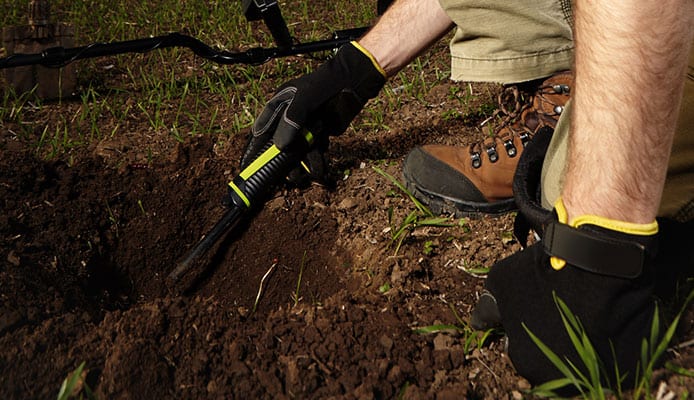
Metal is a common material, but it can be worth a lot of money and depending on the type it can lead to some amazing treasures. The people who try their luck at finding buried treasure commonly use metal detectors to scan large areas. But what if you’ve already picked up a signal and need the specifics of its location? This is when a pinpointer metal detector will come in handy.
A pinpointing metal detector is used for an easy way to locate an object once the digging has begun. This type of metal detector can be used to probe a hole you’ve dug or scan dirt that has been dug up. They are smaller in size and often hand-held, which makes them very portable and lightweight. Plus, a waterproof pinpointer will work in any location, so you can even search in shallow water conditions. With a metal pointer, you won’t ever lose out on finding lost treasures.
OUR TOP PICK
Kuman Treasure Hunting Pinpointer
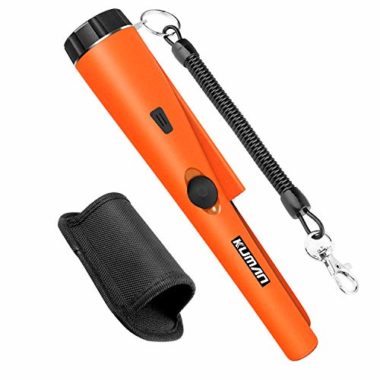
- Stand Out Features - Why We Love It
- 12 kHz frequency makes it highly sensitive for small targets
- Can be used both indoors and outdoors
- Three sensitivity levels are LED light indicated
- Audio and vibration detector alert you to found objects
- One-touch operation is great for kids
Product Dimensions: 9 x 2.5 x 2 inches
Weight: 7.8
Type: Hand-held
Detecting Distance: 0-2 inches
Color: Orange
Accessories: Holster, waterproof sleeve, retractable hanging wire
EDITORS CHOICE
RM Ricomax Waterproof Pinpointer
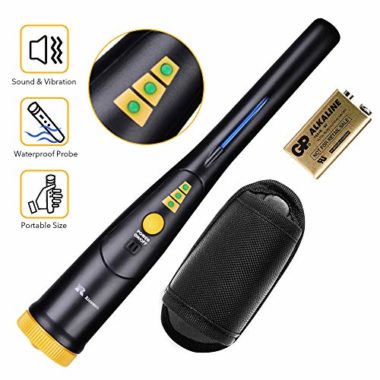
- Stand Out Features - Why We Love It
- Lightweight and compact makes it extra portable
- Simple one-button operation makes it perfect for kids and senior citizens
- Three levels of sensitivity help you avoid unnecessary digging and will accurately detect various types of metal
- Small size can be easily stored in a backpack or car
Product Dimensions: 11 x 1.8 x 1.8 inches
Weight: 5.9 ounces
Type: Hand-held
Batteries: 1 9V
Color: Black/yellow
Accessories: LED flashlight
BEST VALUE
Garrett Pro Waterproof Pinpointer AT
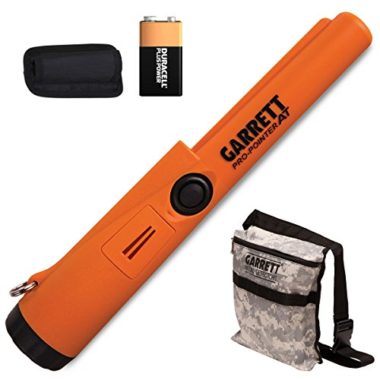
- Stand Out Features - Why We Love It
- Fully waterproof and can be submerged up to 10 feet deep
- Vibrant orange color makes it highly visible, even underwater
- Maximum sensitivity level will locate small nuggets of gold and small sized targets
- Fast return narrows the detection field for precise locations of large targets
- Pro-pointer alarm can be adjusted for volume
- Lanyard attachment keeps your metal pointer at the ready
Product Dimensions: 10.7 x 6.9 x 3.2 inches
Weight: 1.1 pounds
Type: Hand-held
Batteries: 1 9V
Color: Orange
Accessories: Lanyard and LED flashlight
Garrett Pro-Pointer II Pinpointer
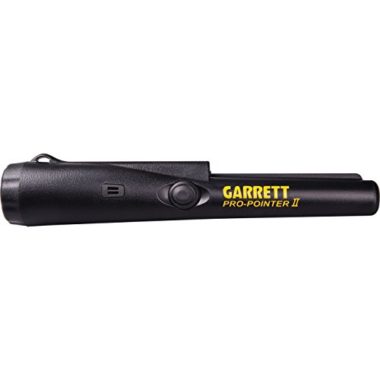
- Stand Out Features - Why We Love It
- Great for beginners who are learning how to use metal pointers
- Safe for use on the beach, which is a great location for beginners to get started hunting
- Easy to use and large power button ensure everyone can use the pinpointer
- 360-degree side scan and scraping blade helps uncover objects faster
- LED flashlight for low-light conditions
Product Dimensions: 9.7 x 2.4 x 2.4 inches
Weight: 10.4 ounces
Type: Hand-held
Batteries: 1 9V
Color: Black
Accessories: LED flashlight
Bounty Hunter Pinpointer
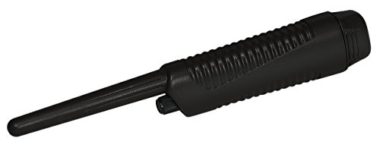
- Stand Out Features - Why We Love It
- Manufactured to the highest quality
- Stylish and innovative design leaves treasure hunters satisfied
- Adjustable sensitivity helps you locate a variety of metals
- Audio and vibration alert signal for potential targets
- Battery strength indicator ensures you never run out of power
- Single knob control is easy to use and ideal for beginners
- Great gift idea
Product Dimensions: 9.2 x 3.5 x 10 inches
Weight: 5.6 ounces
Type: Hand-held
Batteries: 1 9V
Color: Black
How To Choose A Pinpointer Metal Detector – Buying Guide
A lot of pinpointer metal detectors have very similar designs that are compact, hand-held, waterproof, and durable. But they don’t all have the same features, which can determine what makes a quality waterproof pinpointer. Below we have the most important features to consider that can help you find a top rated metal detector pinpointer.
Speed
The faster the processing speed a waterproof pinpointer has, the better it will be able to recovery from reading and differentiating between metal. For iron heavy locations, this can be great because it means that the metal pointer could see a gold coin, even if it is next to an iron object. The best pinpointer metal detector will even have an adjustable speed, so you can find more objects.
Weight
Pinpointers for metal detecting should be lightweight and your arm will thank you for finding a design that is. When you’re searching for metal, you’ll have to move your pinpointing metal detector in a swinging motion to scan for objects, which means a lot of work on your end to maneuver the device. The lighter in weight the device is, the longer you’ll be able to happily scan areas for treasure.
Display
The display should be backlit, which will be tremendously helpful if you are searching in minimal light conditions or dark areas. The backlite will ensure that no matter where you are, you will be able to read the display instead of having to just rely on the sound the metal pointer emits.
Multiple-Frequency Coils
Waterproof pinpointers that have multiple-frequency coils are more accurate with target identification than those without the feature, but contrary to popular belief, you won’t get an increase of scanning depth.
Type
There are actually two types of pinpointers for metal detecting; ones that come attached to a metal detector and separate, hand-held devices. The type that is attached to metal detectors are actually common but may be hard to find on your detector. Most will have a pinpointing mode that you simply enable to use the feature. Other metal pointers, like the ones on our list, are an entirely separate detector that are hand-held and are used to find the specific location of an object.
Ease of Use
A metal pointer shouldn’t be difficult to use. In fact, you should be able to turn it on and start scanning or probing the area. Most will come with preset settings, which are recommended for finding a variety of metal objects, but some may have a few adjustable features. If you want to learn how to use the adjustable features, read the user’s manual and test different adjustments when out in the field.
Waterproof
Waterproof pinpointers are the best option because they allow you to search shallow water areas like lake shores, river banks, and quiet streams. The tip should be able to be fully submerged in shallow water and are resistant to any damage from the rain, which means you can search in any weather condition. However, the controller may not be waterproof, so don’t go throwing your metal pointer into water because they aren’t the same as underwater metal detectors.
You might also like: Perfect Gold Metal Detectors
Sensitivity
Pinpointers for metal detecting should be sensitive enough to pick up a variety of metals and distinguish between a few different types. The only downside is they won’t be able to penetrate deep depths, which is why they are used once you have started digging or are sifting through dirt to find an object.
Durability
When you’re down in the dirt, sorting through rocks, or shift sand, you’ll want durable tools by your side. A metal pointer should be durable and reliable, so that you can stick it in the mud and through the dirt, without it breaking. Durability is important for pinpointers to ensure that they can be used in tough conditions and that they are long-lasting to help you find treasure throughout the years.
Accessories
Sometimes pinpointing metal detectors have a few extra accessories like headphone capability or an LED flashlight to make locating objects easier. These features would be built into the design and most likely, included with the purchase. Pinpointer metal detector reviews are a great place to find out what accessories are included and how well they function.
FAQs
Q: What is the difference between a regular and pinpointer metal detector?
A regular metal detector will be a large sized device that is used to scan large areas for metal objects. You simply walk and scan to pick up readings, which you can then analyze to determine what might be underneath the surface. A pinpointer metal detector is used after you have already located an object with a regular metal detector but have begun digging and need to find its specific location.
Some metal detectors do have a pinpointer feature, but most people prefer to use a smaller, hand-held pinpointer that is separate from their main metal detector. These metal pointers should be lightweight and easy to use, so you can probe the holes you’ve dug or dirt you’ve removed.
Q: What are the benefits of a pinpointer metal detector?
The main benefit of a pinpointer metal detector is being able to specify the location of a target, once you have already located it using a metal detector. This can mean probing a hole you’ve dug, so you know if you need to dig deeper or scanning the dirt you’ve removed to see if you’ve already taken it out of the ground.
The second benefit of a metal pointer is that you’ll save time. Instead of having to keep digging deeper and scanning, you can remove a shovel of dirt, scan the hole and know if your object is deeper down or in the dirt you’ve already dug. This means you won’t waste as much time digging holes and you’ll find your treasure faster, so you can move on to the next area to search for more.
Lastly, you’ll save energy from having to use a large metal detector, by using the smaller metal pointer. For treasure enthusiasts, this gives them the energy to search for longer in hopes of finding relics.
Q: Where can I use a pinpointer metal detector?
Anywhere that metal detectors are allowed, you can also use a pinpointer metal detector. You can go to town on any private property in your name or that you have permission to search on and use any metal detecting tools that you wish. For public property and government owned property the laws may be different.
Most public places like parks and the beach are okay for people to hunt for treasure, as long as you are mindful of other people’s private property boundaries. State parks may even allow metal detectors but require that you don’t disturb anything that is structural or natural, like plant or animal life. In the United States National Parks, all metal detectors are forbidden. Do a little research to your area and what the laws are regarding metal pointers.
Q: What is a pinpointer?
A pinpointer is a type of metal detector that is used to find the specific location of an object. They are smaller sized and often hand-held, with waterproof features to ensure you can search far and wide for treasure. They can save you time and energy with their small size and help you find objects faster, so you can spend the whole day hunting for treasure.
Globo Surf Overview
Treasure hunting is a fun activity that can be a light hobby or a serious investment. Whether you’re a beginner or an expert, the best metal detector pinpointer can help you find the exact location of a treasure you seek. With a durable construction and lightweight body, anyone can use a metal pointer and try their luck with uncovering a few hidden treasures.

